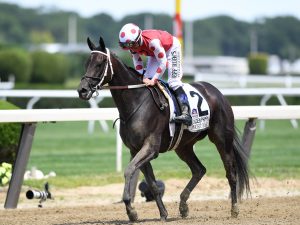By Richard Rosenblatt

King Abdulaziz Racetrack, photo courtesy of www.thesaudicup.com
Let the buildup begin for the latest “World’s Richest Horse Race,’’ this one at King Abdulaziz Racecourse in Riyadh, Saudi Arabia.
We already have a $6 million Breeders’ Cup Classic, a $12 million Dubai World Cup, and for a year (2018), we had a $16 million Pegasus World Cup (now reduced to $3 million.)
But leave it to the Saudis to come up with a pot of gold that boggles the mind. One race over 1 1/8 miles on a dirt surface – not to mention all-expenses paid for horses and connections – for a $20 million purse. Hello, Saudi Cup. Where do I sign?
The purse breakdown is $10 million for the winner, with the other $10 million dispersed among the losers. That would be $3.5 million for second (or first loser), $2 million for third, $1.5 million for fourth, $1 million for fifth, $600,000 for sixth, $500,000 for seventh, $400,000 for eighth, $300,000 for ninth and $200,000 for 10th. Pity the 11th-14th place finishers, who go home empty-handed (swag worth many, many thousands is likely), but can boast of a free two-week trip to Riyadh. Not a bad score for finishing 14th in a 14-horse field.
By contrast, the Kentucky Derby – arguably the most celebrated race on the planet — has a paltry purse of $3 million, with the winner receiving $1.86 million.
“We’re all in,’’ Hall of Fame trainer Bob Baffert told usracing.com/news in a recent interview. “It’s a challenge, and I like challenges.”
The race is Feb. 29, with a scheduled post time of 12:40 p.m. ET.
Baffert will saddle two of five American-based horses, McKinzie and Mucho Gusto. Of course, Baffert has plenty of memorable moments in the richest, and most prestigious, races. A two-time Triple Crown winner, Baffert also has three Dubai World Cup victories, three BC Classic wins, and two Pegasus Cup wins to go along with his 15 Triple Crown race victories.
Back on Aug. 7, at the Fasig-Tipton Sales Pavilion in Saratoga Springs, New York, the chairman of the Jockey Club of Saudi Arabia announced the creation of the race; an undercard has also been set that makes the day of races worth a total of $29.2 million.
“The introduction of the Saudi Cup as an international race is without doubt the most significant event in the history of horse racing in Saudi Arabia, and demonstrates our resolve to develop this great sport in the Kingdom of Saudi Arabia, and also our ambition to become a leading player on horse racing’s world stage,” said JCSA chairman Prince Bandar bin Khalid Al Faisal at the news conference.
And so it’s happening. A full field — you expected less? – of 14 will be entered, with likely half the runners owned by Arab interests, including 2020 Pegasus Cup winner Mucho Gusto (now owned by Saudi Prince Faisal bin Khaled).
Mucho Gusto, who worked 6 furlongs in 1:11.50 at Santa Anita on Feb. 16, earned his way into the race by virtue of his Pegasus Word Cup victory; local horses earn invites by winning local races, such as Mjjack recently capturing the Custodian of the Two Holy Mosques Cup at King Abdulaziz. UAE-based Capezzano was invited after winning the Firebreak Stakes in Dubai.
The official entries will be announced Feb. 25, but for now a star-studded field of 4-year-olds and up from around the globe is set to show up, with American horses scheduled to ship out on Feb. 18.
In addition to Mucho Gusto, a 4-year-old who might be in his best form, Baffert had plans all along for McKinzie to run in the Saudi Cup and then the Dubai World Cup next month. McKinzie, winner of the Whitney Stakes in the summer, was second in the BC Classic.

Midnight Bisou – Photo / USRacing
Eclipse Award winners Midnight Bisou (older dirt female champion) and Maximum Security (3-year-old male champion), along with Tacitus (Wood Memorial winner, third in the Kentucky Derby and second in the Belmont Stakes), are the other American-based contenders.
Midnight Bisou, trained by Hall of Famer Steve Asmussen, worked 5 furlongs in 59.60 at the Fair Grounds on Feb. 16.
Other probables listed by the Saudi World Cup are UAE-based Benbatl, Capezzano, Gronkowski and North America; Japan-based Chrysoberyl and Gold Dream; Saudi Arabia-based Great Scot and Mjjack; and Ireland-based Magic Wand.
The race seems to be perfectly placed for owners looking to hit it big in the first few months of the year. The Pegasus Cup, despite a last-minute slash in the purse from $9 million to $3 million, retained a few top runners, and now there’s a record paydays on Feb. 29, followed a month later by the Dubai World Cup, just a 90-minute flight away.
Plans are being finalized for televising the Saudi Cup. Tom Ryan, director of strategy for the JCSA, said the race could be on Fox Sports 1. Future wager odds at usracing.com currently list Maximum Security as the 7-4 favorite, with McKinzie second at 5-2.
Post time for the eight-race program is 8 a.m. ET.
The day before the Saudi Cup, the track will feature an international jockey’s challenge, featuring seven male and seven female riders.
Among the participants are Hall of Famer Mike Smith, Frankie Dettori, Ryan Moore, Olivier Peslier, Yutaka Take, Nanako Fujita, Mickaelle Michel, Lisa Allpress, Sophie Doyle, and Emma-Jayne Watson.
Prize money for the four-race competition is $400,000 with the winning jockey having a chance to earn $30,000.

Over the years while working at The Associated Press, Rich Rosenblatt became a familiar name to legions of the horse racing fans and industry insiders with his award-winning articles on horse racing and his stories from the backstretch.
In addition to being an astute observer of sports, Rosenblatt is the co-author of The All-American Chili Cookbook. His work has been seen in just about every publication in the world, including The New York Times, The Washington Post and Time Magazine.


